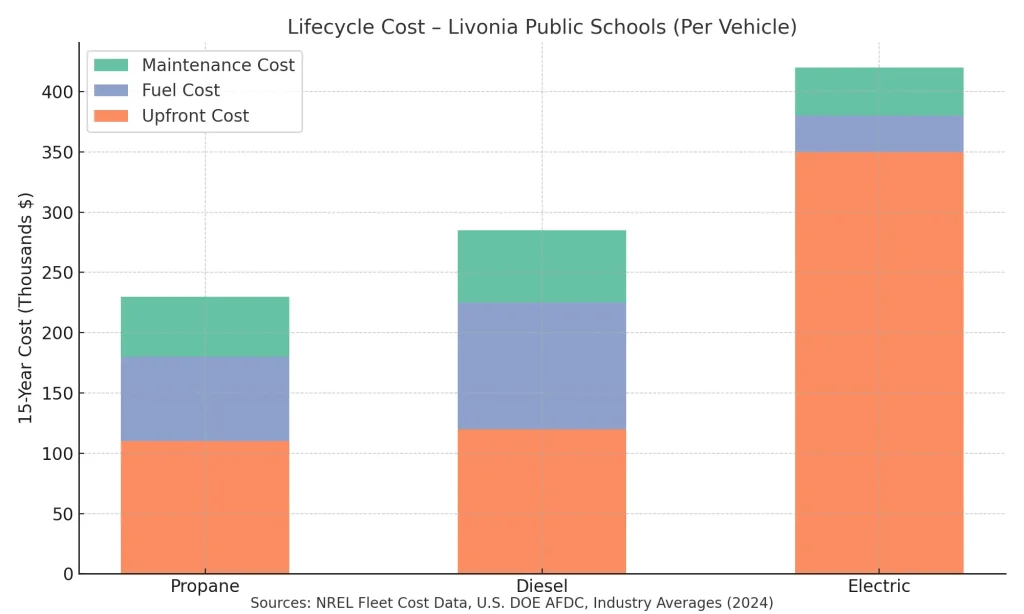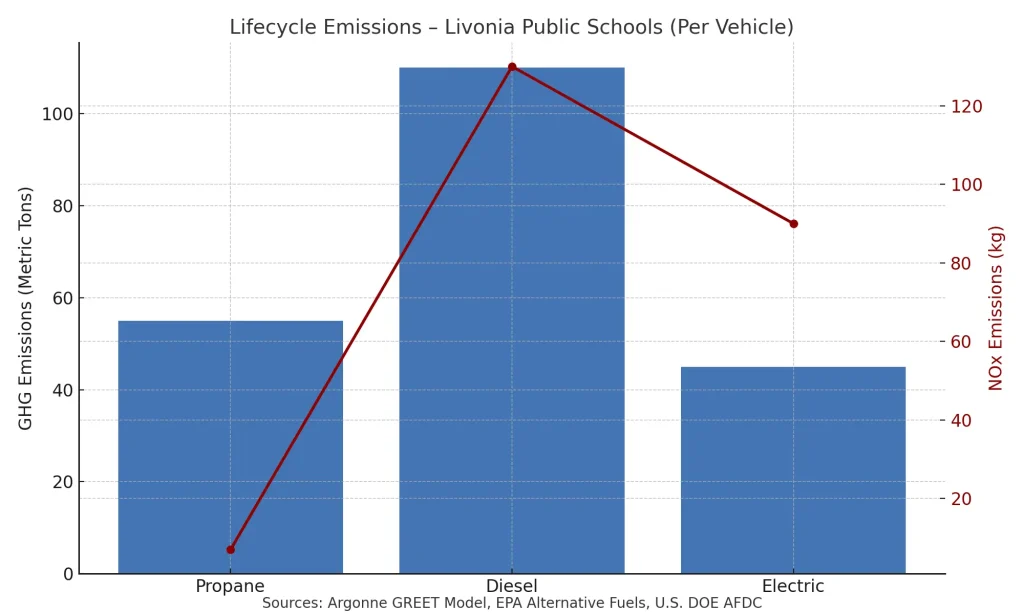Livonia Public Schools Cuts Costs and Emissions with Propane-Powered Buses

Livonia Runs on Propane
- Propane School Bus Fleet – 31
- Savings: Fuel Cost and Maintenance
- Students Transported Daily: 7,000
In 2020, Livonia Public Schools decided to reduce its reliance on diesel and began transitioning to propane-powered school buses, serving more than 7,000 students daily across the district. These buses transport students for pickups and drop-offs at school, field trips, and sports team activities, covering an average of 12,000 miles annually per bus. That’s a lot of miles transporting a lot of kids. They used VW Settlement grants through the Fuel Transformation Program to use for their low-to-no emission fleet. Propane fits as it’s listed as “low-emission” by the EPA. Livonia was able to purchase 11 propane-powered school buses.
Ross Robert, Livonia’s Fleet Garage Supervisor, said, “We decided to go with propane because it’s environmentally friendly and there were federal grants that allowed us to take some of our old tech diesels off the road and replace them with propane buses.” As of 2025, Livonia Public Schools has 31 propane-powered school buses in its fleet, with plans to purchase more in the future.
Propane–Lower Fuel Costs, Higher Efficiency
Propane is an incredibly affordable option for school transportation. Compared to diesel and electric buses, propane buses cost less to fuel and maintain. For Livonia, that means more budget dollars can be used on classrooms and student programs—instead of going toward transportation costs.
Propane buses also require less maintenance than diesel models. Low-carbon fuel equals low-carbon buildup in the engines.
Robert stated in a recent interview with the Michigan Propane Gas Association, “We do see most of our savings with fuel cost, parts, and labor [maintenance]. Because with diesel buses, there’s a lot of downtime, and some of the parts could be very costly when purchasing those. And with propane buses, we’re not seeing so much of the downtime that we see with diesels. And in return, that’s where we’re getting our savings.”
With fewer oil changes, no diesel particulate filters, and no DEF treatments, the district benefits from reduced service costs and more consistent fleet uptime.
“Yeah, with the after treatment system on a diesel, you don’t have that with a propane bus, so that eliminates a lot of our issues we have seen with diesels, and you know there’s no longer a need of the diesel exhaust fluid, the DEF, to put in the propane buses,” says Robert.
Livonia school bus drivers even report that the propane buses are much quieter than the diesel buses. They can hear the students inside the bus versus a diesel, where you get a lot of engine noise, and “they just love that aspect of the bus.”
Cleaner, Lower-Emission Transportation
Propane is a nontoxic, low-emission fuel that won’t contaminate air, soil, or groundwater. It’s the third most widely used transportation fuel in the world—right behind gasoline and diesel—and is officially recognized as an alternative fuel under the Energy Policy Act of 1992.
According to the U.S. Department of Energy Alternative Fuels Data Center (AFDC), propane buses emit up to 96% less nitrogen oxides than diesel buses. These harmful pollutants are associated with respiratory issues, particularly in children. By switching to propane, Livonia helps protect student health while reducing its carbon footprint.
Robert reported that Livonia is saving over 132,000 pounds of CO2 annually by using propane buses instead of diesel, equivalent to avoiding the emissions from driving a diesel school bus from Livonia to Marquette and back more than 275 times.
“ We love propane buses because they're environmentally friendly, they lower emissions, make it safer for our students and community, and these buses are a step in the right direction.”
Ross Robert, Fleet Garage Supervisor
Safe Transport, Powered by Propane
Transitioning your fleet to propane is a straightforward move, especially when you factor in its performance, cost savings, and reliability.
Robert talked about the transition to propane and the infrastructure.
“It was very easy. It took about a month to get up and running, seeing that we didn’t have to dig a hole for a tank to go in and all the plumbing that goes along with that, with gas and diesel. You know, the propane sits right on the ground, and then you have your fuel dispenser right next to it.”
Most schools contact their local propane company to procure a propane contract and have a propane storage tank installed on-site, as seen at Livonia Schools. However, there are other fueling options available to schools, such as public fueling stations and mobile fueling services. Livonia started with one 2,000-gallon tank, but as their propane fleet grew, they decided to get a second tank to meet their fuel needs. Read more about cost-saving fueling options at MPGA’s website: MiAutogas.com
Robert reported fueling a propane school bus: “It’s almost as easy as fueling a gasoline or diesel school bus. With our fleet gear and our dispenser, we have a Euro-style fitting, so it’s just as easy as putting it to the male coupling and pulling the trigger, and propane is being dispensed. That’s why it’s safe for the person who is fueling the bus.”
He also mentioned that there is training when it comes to filling a propane bus, but it is pretty easy for the bus drivers, “so when we get new drivers that come in, they have to go through a propane training, which I’m the trainer on. I go through the whole system, how it works, all the safety features and protocols that would need to be taken in case of an accident, and teach them the properties of propane, where all the shutoffs are on the complex, fire extinguisher, etc. Everyone here is trained after that half-hour to an hour training course.”
No Idling. No Delays. Just Warm Starts.
Livonia’s propane buses start reliably even on the coldest Michigan mornings—without the need for costly engine block heaters, fuel additives, or backup generators that diesel and electric buses often depend on. This simplicity leads to less downtime and safer, more consistent transportation for students.
Robert discussed their propane school buses when it comes to Michigan winters, “A propane bus is very reliable, just like any other bus in terms of driving in the snow and icy weather; they handle just fine. I would say overall they’re safe and our drivers love them, especially during the winter months, compared to diesel. They warm up a lot quicker. You can go in and you just turn your key and it starts right up like you’re leaving for work in the morning in your own personal car.”
“The drivers, I know they love it because when they start up the bus in the morning, 5-10 minutes, the inside is hot or heated from the heaters. And so when they get to the first stop, you know, the student is not sitting in a cold bus.”
$6,000 Available from the Michigan Propane Gas Association
The Michigan Propane Gas Association is offering fleets up to $6,000 to help them immediately reduce transportation operation costs and reach carbon footprint goals. The MPGA propane fleet experts are available to help with a smooth transition to propane with fleet directors/managers, treasurers, and superintendents.
Learn more at: MiAutogas.com/#funding


